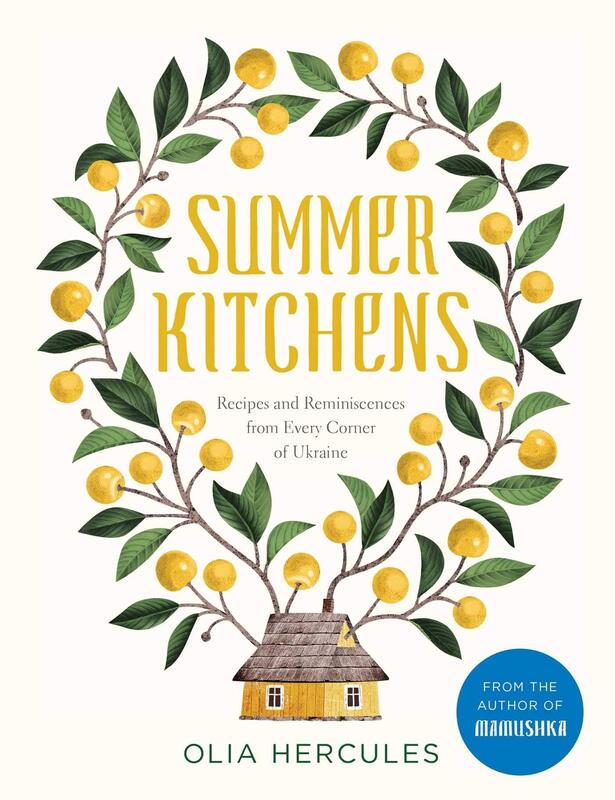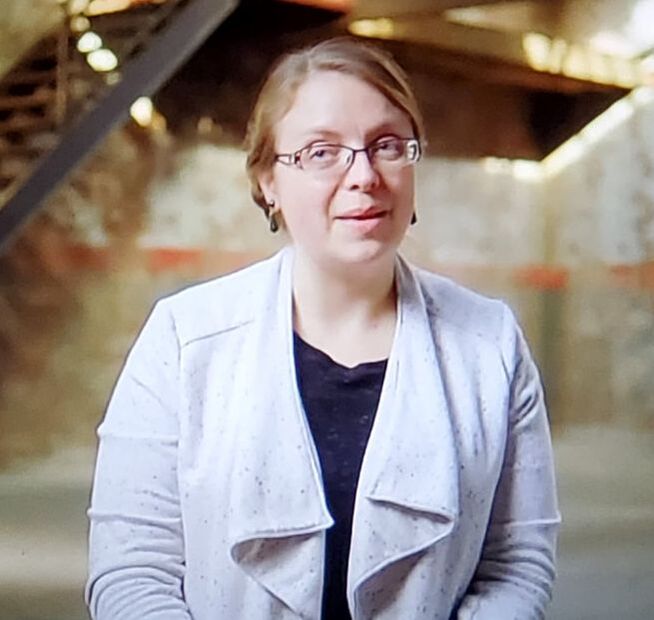|
This post contains Amazon affiliate links. Summer Kitchens Recipes and Reminiscences from Every Corner of Ukraine by Olia Hercules had been on my wish list for a while. Released in 2020, it seemed like just exactly the kind of cookbook I would like - interesting recipes linked with interesting stories. When Russia invaded Ukraine in late February, and Olia Hercules became a defacto spokesperson for Ukrainian foodways, I decided to finally purchase it. I'm quite picky about cookbooks, and it takes a lot to impress me. The recipes need to be familiar but surprising, introducing me to new techniques and especially flavor combinations. The headnotes have to be robust, the recipes not too finicky, and the storytelling excellent. Summer Kitchens manages to meet and exceed all of these requirements. It's really quite a stunning little book. Olia is just a year older than me, was born and spent most of her childhood in Ukraine. At age 12 her family moved to Cyprus for her asthma, and as a young adult she moved to London to study, where she lives today. She started her career in film, and it shows through her storytelling. She also worked as a professional chef, including for Ottolenghi's. Summer Kitchens is her third cookbooks. Her first, Mamushka: Recipes from Ukraine and Eastern Europe, was published in 2015, and her second, Kaukasis The Cookbook: The culinary journey through Georgia, Azerbaijan & beyond, was published in 2017. Her fourth cookbook, Home Food: Recipes to Comfort and Connect, is due to be released in December of this year. Although I haven't read her earlier cookbooks, I did have the opportunity to flip through Mamushka in a bookstore the other day, and I have to admit it wasn't as appealing as Summer Kitchens. I think that's in part because Summer Kitchens is all about that indefinable longing for a home you only knew for a little while. Like Olia, and many of the authors of letters she includes in the back of the book, I have memories of rural idylls as a child. Mine were of visiting my great-grandmothers in rural North Dakota in the summer. Of enormous gardens where I learned that peas actually aren't so bad if you eat them fresh and sweet right from the pod. Of old-fashioned flowers, and dirt cellars full of glass jars of preserved food. Of freshly-turned black dirt in the potato patch so soft it was perfect for bare feet to make impressions. Of homemade baked beans (my first ever taste) and fat, nutmeg-scented donuts and homemade pickles and sweet water buns with bright red chokecherry jelly. Of rhubarb custard cakes and the world's best North Dakota red mashed potatoes. Of playing beneath enormous cottonwood trees with their rustling leaves, and searching the quiet gravel roads for agates and quartz and petrified wood. Olia's reminiscences are a little different, but they still resonate. Sunny days in gardens, preserving food for winter, helping grandmas and moms clean fruit and chop vegetables. Memories of delicious homemade foods, special holidays, and especially the pich - the enormous brick and tile stoves that are common in many northeastern European countries, including my ancestral Scandinavia. The cookbook itself is divided seven chapters of recipes, preceded by essays on the summer kitchen and Ukraine's unique food regions. The chapters are:
Although the chapter on fermenting will likely make Americans flinch slightly (Summer Kitchens was published in the UK, which apparently does not have as stringent rules about food preservation advice as the U.S.), the recipes sound amazing, and several don't require preservation at all, including the intriguing-sounding smoked pears (and plums). I was interested to see that Hercules included watermelon molasses in the cookbook. Her headnotes indicate that she included it more for posterity than for anyone to use it, but sweet watermelon paste is still used in some areas of North Dakota, where Germans from Russia immigrants left Ukraine for the Northern Plains. Although it is definitely not a vegetarian cookbook, many of the recipes are vegetarian. This reflects in part the background of the people who developed this cuisine - meat was not always abundant, and vegetables often were. But also, as Hercules mentions, her husband is vegetarian, as are many of her friends, and so she cooks vegetarian often. This was incredibly refreshing for me to see. I am not vegetarian, but enjoy vegetarian food and am always looking for new recipes. Some, like cucumbers in sour cream are familiar. Others, like a tomato mulberry salad with red onion and purple basil are stunningly beautiful and sound delicious. Even the meat recipes, which I usually find boring in most cookbooks, are inviting, like the slow-roasted pork with sauerkraut and dried fruit. Fatty pork gets rubbed with spices and then cooked slowly in the oven with sliced onion, sauerkraut (homemade, of course), prunes, dried apricots, apples, and toasted caraway, coriander, and fennel seeds. Olia recommends fending off greedy guests to ensure enough leftovers to stuff into a sweet bun recipe also included in the cookbook. With the exception of pistachio napoleons and poppyseed babka, the dessert recipes are also unfussy and delicious-looking. A caramelized apple ricotta cake, classic potato-dough dumplings stuffed with halved plums and served with honey, steamed bilberry-stuffed donuts rolled in crushed walnuts and sugar. Summer Kitchens is not just about summer cooking. It is about how summer kitchens have been used throughout Ukraine historically, how they continue to be used, and what they represent. It's no accident that Hercules starts her book in September, with preserving season. Because the summer kitchen is also a reflection of the summer garden. Many recipes, especially in the first chapter, reflect an abundance of produce that most of us no longer have access to. Hercules even notes this change in her essays, noting in one how dismayed a young Ukrainian was to find her uncle had dropped a forty pound sack of cucumbers off on her front step. Instead of joy at the opportunity to turn free produce into pickles, the young woman saw only work and the guilt to do something with the cucumbers before they went bad. And therein lies the rub. While Hercules has managed to produce an amazingly atmospheric and even cozy cookbook full of recipes any home cook with a little ambition could produce, it is also a love letter to a way of life many would say is dying. Hercules herself admits that her beloved pich ovens are increasingly being torn out for more modern appliances, and summer kitchens are being converted or torn down. It's easy to romanticize the past, to the frustration of those trying to still live it. But in a day and age when whole generations dream of giving up the rat race and settling in a little rural cottage with a big garden, Olia Hercules' depictions of Ukraine can sound like paradise. And perhaps it is. But in a time when Ukraine is being torn apart by war (again) and threatened with hunger (again), Summer Kitchens reads more like a love letter to what every Ukrainian would love to have, but can never seem to grasp for long. Serfdom, World Wars, collectivism, famine, invasion, Sovietization - all these have threatened but never quite destroyed the Ukrainian garden of Eden. But like most old foodways, Ukrainian food is threatened by modernity. I'm hopeful that books like Summer Kitchens will help keep them alive. The Food Historian blog is supported by patrons on Patreon! Patrons help keep blog posts like this one free and available to the public. Join us for awesome members-only content like free digitized cookbooks from my personal collection, e-newsletter, and even snail mail from time to time! Don't like Patreon? Leave a tip! If you'd like to learn more about Ukraine, food history, and politics, check out my new Substack newsletter - Historical Supper Club.
0 Comments
Your comment will be posted after it is approved.
Leave a Reply. |
AuthorSarah Wassberg Johnson has an MA in Public History from the University at Albany and studies early 20th century food history. Archives
July 2024
Categories
All
|


 RSS Feed
RSS Feed